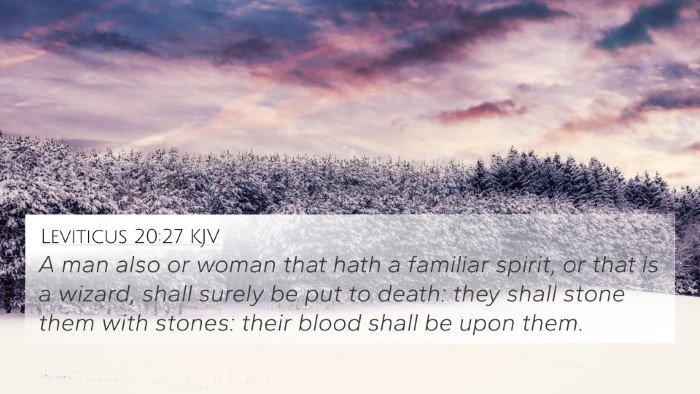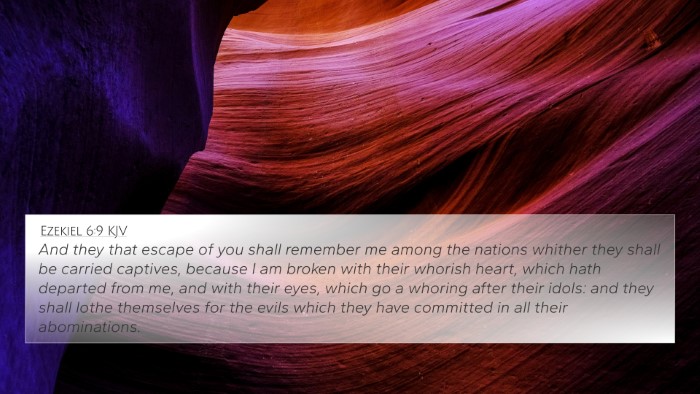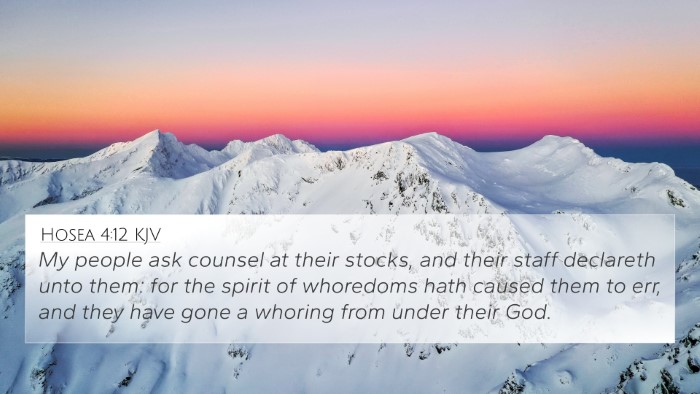Understanding Leviticus 20:6
Verse: Leviticus 20:6 states, "And the soul that turneth after such as have familiar spirits, and after wizards, to go a whoring after them, I will even set my face against that soul, and will cut him off from among his people."
Meaning and Interpretation
This verse addresses the grave sin of seeking guidance from mediums or wizards, describing such practices as a form of spiritual infidelity. It underscores the seriousness with which God views idolatry and paganism. The consequences outlined in this verse, wherein God promises to "cut off" those who engage in these activities, reflect the covenant relationship between God and His people, where adherence to His commands is crucial.
Commentary Insights
-
Matthew Henry:
Henry emphasizes the spiritual danger of turning to familiar spirits for guidance. He likens it to betrayal against God, comparing the act to infidelity in marriage — a profound violation of trust. He interprets "cut off" as a separation from the community and from the blessings that come with being among God's people.
-
Albert Barnes:
Barnes highlights that the act of consulting with spirits reflects a rejection of God's authority and direct insight. He explains that such practices were common among neighboring nations and that God's people are specifically admonished against them to avoid corruption and moral decay.
-
Adam Clarke:
Clarke points out the problematic cultural context wherein ancient Israel was surrounded by nations that engaged in occult practices. He conveys that this verse serves as a strict warning against adapting to the destructive customs of those surrounding them, ensuring that the Israelites maintain their distinct identity as God's chosen people.
Cross-References
Leviticus 20:6 relates to several important scriptures that further elucidate its themes. Below are some notable cross-references:
- Deuteronomy 18:10-12: This passage condemns practitioners of divination, sorcery, and mediums, paralleling the warnings in Leviticus 20:6.
- Isaiah 8:19-20: Isaiah highlights a similar condemnation, advising the people not to consult the dead on behalf of the living.
- Galatians 5:19-21: Paul includes sorcery in a list of sinful practices that disturbs the Spirit-led life, linking Old Testament prohibitions to New Testament teachings.
- 1 Chronicles 10:13-14: The downfall of Saul due to his consulting a medium illustrates the tragic outcomes associated with turning away from God.
- Revelation 21:8: This verse speaks of the fate of the fearful, unbelieving, and abominable, including sorcerers, reaffirming the severity of such practices in God's sight.
- 1 Samuel 28:7-20: The account of Saul's encounter with the witch of Endor shows both the spiritual consequences and divine disapproval of seeking guidance from the occult.
- Jeremiah 27:9-10: This chapter warns against listening to false prophets and diviners, further emphasizing the danger of diverging from God's commands.
Thematic Connections
Leviticus 20:6 invites deeper theological reflection on the themes of faithfulness, obedience, and divine justice. The connection between this verse and various passages throughout the Bible reveals a consistent message regarding the gravity of spiritual integrity:
-
The Nature of Divination:
Across scripture, divination is consistently portrayed as an affront to God's sovereignty. Scriptures emphasize reliance on God's word and guidance rather than seeking answers through forbidden practices.
-
The Call for Holiness:
God's demand for holiness from His people is a recurring theme in the Bible. Leviticus 20:6 reinforces the call to remain distinct and set apart from worldly influences and practices.
-
Separation from Sin:
Heartfelt separation from sin is emphasized in both Old and New Testaments. Believers are encouraged to seek moral purity and reject sinful behaviors that lead to spiritual corruption.
Practical Application
In modern contexts, Leviticus 20:6 challenges believers to evaluate the influences in their lives. It leads to introspection about:
- The sources from which we seek guidance and wisdom.
- The importance of adhering to biblical principles over secular or occult practices.
- The necessity of maintaining a vibrant relationship with God, avoiding distractions that deviate from His truth.
Conclusion
Leviticus 20:6 serves as a reminder of the serious consequences of turning away from God’s teachings. By exploring its meaning through historical context and cross-references, believers can draw valuable insights for their spiritual journeys. The interconnectedness of scripture enhances our understanding of God’s unwavering call for faithfulness, warning against the allure of worldly practices that lead us astray.
As one delves deeper into the wealth of biblical text, resources such as Bible concordances and cross-reference guides can greatly aid in revealing connections between verses, enriching one’s study and interpretation of God’s word.













